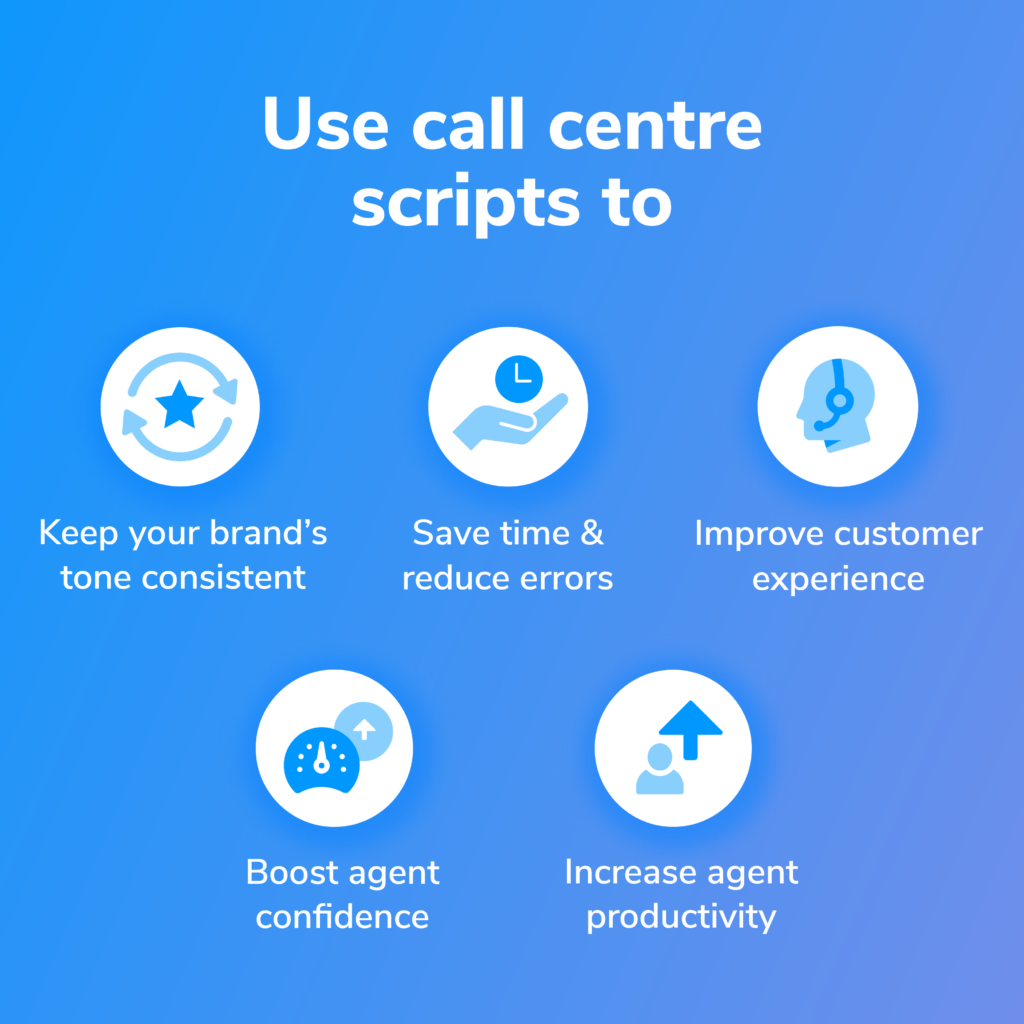A telephone conversation is often the simplest and fastest way to get something done, especially now, given the levels of anxiety and restlessness resulting from the global pandemic.
When customers call a contact centre, they expect an accurate, speedy and appropriate resolution for their concerns. Pre-defined scripts can ensure that brands deliver that consistently.
What is a Call Centre Script?
A call centre script is a structured, pre-written document that helps call centre agents navigate different customer interactions. It provides agents with clear direction on how to respond in various scenarios, helping reduce mistakes and improve efficiency during calls.
While scripts offer valuable guidance, they shouldn’t make agents sound robotic. The most effective call centre scripts allow room for personalization, enabling agents to use their natural tone and conversational style. When used correctly, scripts enhance consistency and elevate overall agent performance.
In this blog post, we discuss the benefits of using call centre scripts, best practices for creating them, and some examples.
Why should brands use call centre scripts?

The primary reason brands use call centre scripts is to ensure consistency. Brands make sure that every customer gets the same experience every time by giving scripts to their agents. Scripts ensure that the:
- Information given to customers is consistently accurate
- Tone, style and voice are that of the brand instead of each individual agent
- Emotion of the call is positive
Thoughtful call centre scripts can have a significant impact on the overall customer experience. Here’s how.
Scripts save time: With scripts, agents will have accurate information accessible at all times. As a result, they can resolve customer queries faster. Moreover, if all of the scripts are organised effectively and available quickly, agents can also save the time spent looking for information. Finally, scripts also help you train agents faster — with clear and detailed scripts, your agents can be trained on the job.
Reduce human errors: When information is committed to memory, agents can either forget it entirely or misremember it. As a result, they might give away false information to callers. This is truer for new agents. Scripts help avoid this.
Improve customer service: With the help of a script, agents can focus on building rapport with customers instead of worrying about remembering information. Even if they get distracted or frazzled in the middle of the call, they can return to the script and reorient themselves.
Boost agent confidence: Having answers to all possible questions at hand gives agents a boost of confidence. When your agents know what to say, they will no longer be anxious about facing unfamiliar situations.
Increase productivity: A culmination of all of the above benefits of having call centre scripts is that it improves agent productivity. With scripts, agents will be able to:
- Attend to more callers every day
- Ask the right questions and move the conversation in the right direction
- Ensure all possibilities are considered before offering a resolution
- Resolve issues themselves without having to ask another agent or escalate to a manager
How to write effective call centre scripts?

The most important part of an effective call centre script is relevance to the customer. So, begin by understanding your customers, their needs, expectations and common concerns. You can also do this by speaking to a small group of customers about their experience with your brand.
Map the emotional state a customer might be in when they call. For instance, if you’re an insurance company, customers are likely to be in great emotional distress when they call for claims. Your scripts need to have empathy for them. Identify your brand’s tone of voice and ensure it is reflected in your scripts.
Have a precise opening: It’s essential to make the caller feel welcome and reassured. A good opening line can do that. For example, include a greeting, mention the agent’s name, inform them if the call is being recorded, thank them for calling and invite them to ask a question.
For instance, “Hello [customer name], thank you for calling [company name]. This call is being recorded for quality purposes. You’re speaking to [agent name]. How can I help you?
Keep scripts short and easy to skim: The primary role of a customer service script is to help your agents resolve queries. If your scripts are lengthy and complex, your agents will waste time searching for information, causing communication gaps and pauses. Lengthy scripts can also keep the agent speaking for too long, frustrating the caller.
Highlight key phrases or statements: Colour-coding, highlighting or even using different fonts for important points in the script will help easy navigation. You can avoid monotony of speech by highlighting words that need to be emphasised.
Be specific: Think of all possible questions or problems your customers might face and develop different scripts for each of them. To enable this, keep updating your scripts regularly for emerging scenarios.
Personalise: Sometimes, a script can make the conversation sound mechanical. To make it livelier, suggest where your agents can personalise the script. They can either include the caller’s name or make a minor tweak based on the situation. For instance, the agent can ask, “Are you and your family safe?” to demonstrate empathy during the pandemic.
Avoid negativity: Ensure that your scripts have a positive tone and approach always, especially for difficult situations. For instance, even if it is the customer’s fault, write the script that does not blame them. This will help make the customer experience pleasant and make them believe there will be a fruitful resolution in the end.
Optimise regularly: Scripts are not a one and done thing. Depending on the situation, the evolution of your brand, needs of your customers etc., you might need to evolve your scripts too. Be open to change.
How to effectively use scripts?

Creating a good script is only the first step. You also need to know how to use it wisely. Here are some pointers.
Teach your agents to sound natural: One of the biggest criticisms of call centre scripts is that they make agents sound like robots. This happens because agents, especially new ones, focus too much on reading the exact words on the script instead of having a conversation with the customer.
Train your agents to sound as natural as possible while using the scripts for reference. Practice the tone and pace of delivering the script until it feels natural and engaging to create a good rapport. Also, let them know that they can make minor deviations to sound natural.
Train agents on when (and when not) to use the script: While there are significant benefits to using a script, there are always situations where your agents might find it better not to use them too. For instance, an unprecedented situation. Or an extremely agitated customer. In such cases, your agents will need to improvise.
Train your agents to identify when a script will not be useful. Also, train them to improvise, think on their feet and seek help from seniors.
Track effectiveness: Monitor call recordings regularly. Speak to your agents to understand the usefulness of the scripts and to identify gaps. Regularly review and rewrite your scripts to improve them.
Inbound call centre script examples
For the purpose of these examples, let us assume that your brand is an e-commerce marketplace selling a variety of products. Here are examples of scripts you can use for an inbound call centre in such a scenario:
→ Scenario #1: When a customer wants to buy a product out of stock
Customer: Hi, I came across this [product’s name] on your website. I tried to place an order, but I couldn’t. How can I buy it?
Agent: Hello [customer name]. I see that [Product name] is currently unavailable. We expect it to be back in stock in two weeks. I can place your order first in line so that you receive it as soon as it is restocked. Shall I?
Your response should always be positive to encourage the customer to stay loyal to your brand and not choose your competitor over you. When faced with a situation where you are currently unable to meet their requirement, offer an alternative. In the above example, your call centre scripts for agents can also include suggestions of other equivalent products.
→ Scenario #2: An impatient customer
Customer: I had ordered [product name] from [company name] a week ago. The website claims that the package was supposed to arrive two days ago, but it hasn’t. I am not able to track or have any idea of where my package is! What is going on?
Agent: I apologize for the delay, [customer name]. I am looking into the matter and see that your order has been shipped. The delivery is delayed due to weather-related issues. It is scheduled for delivery to your address tomorrow. Sorry for the inconvenience caused. We are doing everything we can to ensure that it reaches you at the earliest.
Not receiving packages on time can irritate your customers, and they would expect a resolution as soon as possible. In such situations, apologise, empathise, explain the problem and help them understand how you will fix it. In addition, offering compensation for the inconvenience can help lighten the mood of the impatient customer.
→ Scenario #3: An angry customer
Customer: Hi! I recently purchased this [product name], but it is nothing like how it was shown on the website. The item that you delivered was damaged and faulty. This is totally unacceptable. I need a refund for this immediately!
Agent: Hello, [customer name]. I am sorry that this happened to you. We strive to ensure that our products are of top quality. I can replace the products right away or refund your amount. Could you please send me a photo of the defect for the reports?
When your products don’t match customer expectations, they are bound to get angry. Be careful not to agitate them further. Don’t blame them for the problem. Instead, reassure them that you will make amends immediately. Explain their options and suggest the best solution. Make sure your call centre scripts to handle customers like the one above have specific pointers about tone, voice etc.
At the end of an inbound call, offer a call centre closing script too. Ensure that your agents thank the caller for calling, confirm that their query has been resolved, and invite them to provide feedback. For example:
Agent: Thank you for calling [company name]. Is there anything else I can help you with? Your feedback is valuable to us. May I please transfer your call to an IVR survey to collect feedback about this call? It will only take 10 seconds.
Outbound call centre script examples
While contacting potential customers or existing ones, it’s essential to have all the information at hand. Having both the call centre opening script and the closing script will help your agents make effective outbound calls. Here are some examples you can use for your outbound call centre.
→ Scenario #1: Payment reminder
Agent: Hello. This is [agent name] calling from [company name]. This is a payment reminder for [invoice reference number], due on [due date]. Have you received this invoice? Can I help you in making the payment online?
If you have any questions about this invoice, please let me know.
When you’re making a reminder call, it’s important to get to the matter as quickly as possible to ensure that the customer doesn’t mistake it for a sales call. Be specific. Offer help if they need it.
→ Scenario #2: Follow up call
Agent: Hello [customer name]! This is [agent name] from [company name]. I’m following up on the [product name] we discussed last week. Is now a good time to talk?
Have you made a decision about the purchase? Is there anything I can help you with?
Always start with a quick reminder about your previous discussion. Then, offer to give them more information if they haven’t been able to make a decision. It might also help if you have a special discount or promotion to expedite their decision.
→ Scenario #3: Upselling
Agent: Hello [customer name]! I am [agent name] calling from [company name]. Based on your existing relationship with [company name], we are offering you an upgrade on your [product name]. It is a free upgrade and will be activated immediately. May I explain its benefits?
While upselling, it is vital to connect with the customer’s existing relationship with your company. Demonstrate that you are offering them value. If the customer is either busy or hasn’t yet decided, your agents will also need an appropriate closing script.
Agent: I understand that. Is there any other information you need to help with the decision? When can I call you back next to take this forward? Thank you very much, have a great day!
Call centre scripts to handle customers effectively
Being the primary point of contact, call centres can play an important role in shaping customer experience. To ensure a delightful, consistent and positive customer experience, you need call centre scripts for your agents.
A comprehensive collection of scripts can help:
- Deliver a consistent experience to all customers
- Educate agents quickly and effectively
- Reduce errors or discrepancies in processes
- Focus on building rapport with the caller
- Minimise resolution time
- Boost agent confidence and productivity
Customer service scripts are among the many tools that brands use to deliver delightful experiences through voice channels. For more on how you can leverage cloud telephony to improve your call centre efficiency, speak to our product expert today.
 +91-808 8919 888
+91-808 8919 888 +91-808 8919 888
+91-808 8919 888 +966 135 181 912
+966 135 181 912




